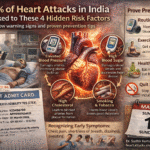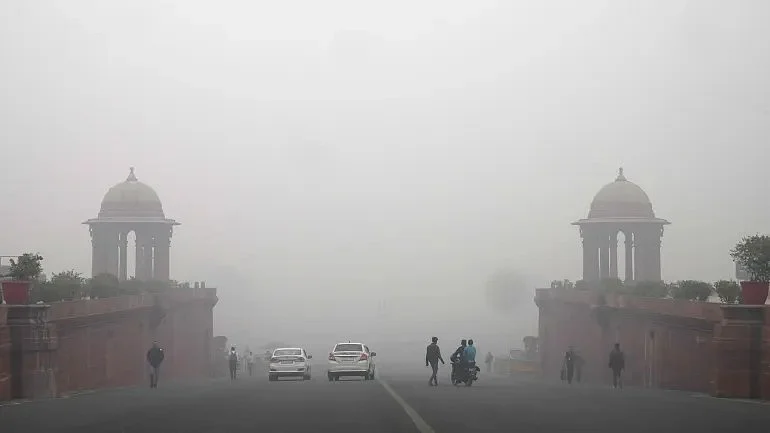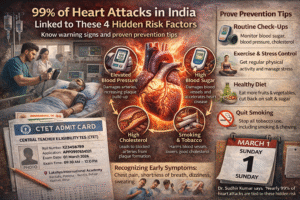As winter approaches, the capital and NCR are soon to be again engulfed by thick grey pollution, and doctors are ringing alarm bells on a worrisome observation — an increase in rheumatoid arthritis (RA) cases that may be attributable to the region’s chronic air pollution. Once thought of as only a genetic ailment seen in aging patients, RA is now surfacing as yet another complication to the hazardous air in Delhi.
The Hidden Effects of Air Pollution Beyond the Lungs
Residents of Delhi-NCR have suffered from hazardous air quality for years, especially during Diwali season and straw-burning season, but this year, the experts speaking at the 40th Indian Rheumatology Association Conference (IRACON 2025) signaled that pollution may go beyond respiratory and cardiac issues, to joint and immune system issues.
“Delhi air is not only damaging lungs, it may be rewriting immune responses,” said one leading rheumatologist. “We are seeing cases of patients developing RA at a younger age and much more aggressively, and remarkably, no one in the family line has any record of RA.”
What is Rheumatoid Arthritis?
Rheumatoid arthritis is an autoimmune chronic disorder. Unlike other disorders, RA occurs when the body’s immune system thinks for any reason that joints are attacking the enemy, which causes pain, swelling, and stiffness. Over time, the body will cause irreversible damage and/or disability. In addition to genetic and hormonal aspects, many instances of RA have environmental causal factors.
In India, approximately 1% of adults are thought to have RA (rheumatoid arthritis). In particularly polluted areas such as Delhi, which regularly experiences PM2.5 exposure levels greater than 100–150 µg/m³ (versus the WHO recommendation of 5 µg/m³), the percentage could be much higher.
What the science says
Research is now emerging in finding several mechanisms by which pollution may be driving autoimmune diseases like RA.
Oxidative stress and inflammation: Fine particulate matter (PM2.5) carries a burden of toxins that lead to oxidative stress, triggering a cascade of inflammatory processes in the body.
Immune misfire: Chronic exposure can reprogram immune tolerance so that the immune system starts to attack its tissue, including producing autoantibodies.
Epigenetic changes: Poll
Information From Delhi and Other Places
A recent cross-sectional investigation at AIIMS examined 1500 individuals who had lived in Delhi for a long time. Among healthy participants, 18% tested positive for autoantibodies such as rheumatoid factor and antinuclear antibodies — early signs of autoimmune dysfunction — and almost 70% exhibited increased inflammatory markers. The results were amplified in individuals living within 200 meters of major roadways.
The link between ambient pollution and immune-mediated inflammatory disease is valid worldwide, as reported in a study from Kuwait that showed increasing activity disease scores in RA patients exposed to air with high levels of SO₂ and NO₂.
Delhi — A Potential Pollution-Related Autoimmunity Hotspot
Physicians across Delhi and surrounding suburbs have increasingly recognized a growing number of younger patients manifesting symptoms of RA — frequently developing more severe joint manifestations and faster disease activities. Some researchers believe Delhi may be developing into a global hotspot for pollution-mediated autoimmune disease.
Nonetheless, researchers also caution that correlation does not equal causation. For definitive links to be established, longitudinal studies examining genetics, exposure, and onset of disease are still needed.
Protecting Yourself in a Polluted Environment
In order to make large-scale policy changes, individuals can do a few things to help mitigate the risk of air pollution exposure:
Minimize your exposures: Use indoor air filters, avoid outdoor exposure when the smog is heavy, and wear an N95 or KN95 mask when outdoors.
Eat an anti-inflammatory diet: Consume anti-oxidant dense foods, like vegetables, fruits, and sources of omega-3.
Exercise and avoid cigarettes: Exercise improves joints in Rheumatoic Arthritis patients and smoking increases risk of RA.
Seek early screening: Joint stiffness or pain that happens often (> 4 times per week) for >6 weeks post-injury, despite appropriate treatment, especially in 2 or more joints, suggests it could be rheumatic and blood pressure elevation in this scenario could warrant seeing a rheumatologist.
Clean Air – A Cure for Health
The pollution emergency that continues to plague Delhi may be quietly causing another public health challenge – one that is breaking down the body from the inside. There is now additional evidence – rheumatoid arthritis – that shows the impact of air pollution goes far beyond the lungs, wreaking havoc on immune systems and elongating long-term chronic disease.
While the scientific community continues to work toward determining the exact causal mechanisms, what is undoubtedly true is that clean air is medicine. Reducing emissions and safeguarding air quality for urban dwellers is no longer just an environmental issue – it is now a health imperative for the nation – one that could save lives and protect not just hearts and lungs, but the very joints that keep the country moving.












More Stories
99% of heart attacks in India are linked to these 4 hidden risk factors know warning signs and proven prevention tipesheart attacks
‘Work shouldn’t consume every hour’: Indian tech professional on UK vs India office culture
Packaged food hurting productivity, mental health in young Indians: Report